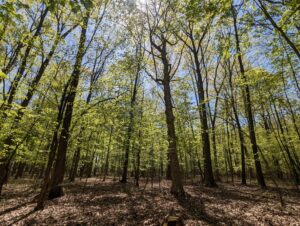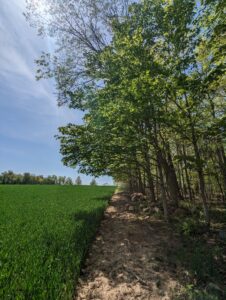Legacy Land Conservancy is pleased to announce that the project, Southeast Michigan Conservation Coalition (SMCC): Increasing Permanent Land Protection and Equity of Access to Conservation Tools, has been selected for a $24.6M Regional Conservation Partnership Program (RCPP) award made possible by the U.S. Department of Agriculture’s (USDA) investment to advance conservation and climate-smart agriculture across the country.
Last week the USDA awarded a historic $1.5B for 92 partner-driven conservation projects through RCPP, a partner-driven approach to conservation that funds solutions to natural resource challenges on agricultural land. The SMCC RCPP project is the only one in Michigan to receive funding this year.
The investment is made with funding available through the Farm Bill and the Inflation Reduction Act. The Inflation Reduction Act is the largest investment in climate action and conservation in world history, which has enabled USDA’s Natural Resources Conservation Service (NRCS) to boost funding for RCPP.
“This federal funding will preserve 4,000 acres of forest and farmland in Southeast Michigan, supporting projects that are driven by Michigan farmers and their partners who have the most at stake when it comes to taking care of our land and water,” U.S. Senator Debbie Stabenow said. “It’s an investment in the efforts of small businesses, local governments, farmers and ranchers, and conservation leaders to strengthen local economies and preserve our Michigan way of life for generations to come.”
Conserving farm and forest land in southern Michigan is an important tool to balance the region’s expanding development and economic needs with the natural infrastructure necessary to ensure clean air and water, and provide access to local fresh food.
In Michigan, the southeastern area of the state is a unique intersection of complex environmental and social geography. Its remaining open lands and mounting development pressure demand elicits the need for urgent, creative, permanent land protection measures. Jackson, Lenawee, Livingston, Washtenaw, and Wayne counties lost 88,000 acres of agricultural and non-industrial private forest land between 1992-2022, a 12.7% decrease in just 30 years.
Through the collaborative efforts of multiple nonprofit and local government partners, the SMCC RCPP project aims to conserve farmland and forests in southeast Michigan by protecting 4,000 acres of private land through conservation easements, expanding resources aimed at increasing permanent land conservation, and conducting outreach to historically underserved producers in Jackson, Lenawee, Livingston, Washtenaw, and Wayne counties. It will mobilize partnerships to drive community-led support for land protection through town hall meetings, outreach events, county-based conservation resources, and strategy development with local partner organizations.
In a critical urban-rural junction where farmable land is disappearing quickly, the SMCC RCPP project is an innovative way to counter the severe threat of land conversion and provide more equitable land access opportunities. Its success can serve as a replicable model for permanent land protection elsewhere in the state and Midwest.
 Legacy will operate as the lead entity for the project, responsible for managing the deliverables and coordinating funding for the regional coalition partners–the City of Ann Arbor, Ann Arbor Township, Scio Township, Washtenaw County Parks and Recreation Commission, Dexter Township, Webster Township, Northfield Township, Augusta Township, Southeast Michigan Land Conservancy, and Livingston Land Conservancy.
Legacy will operate as the lead entity for the project, responsible for managing the deliverables and coordinating funding for the regional coalition partners–the City of Ann Arbor, Ann Arbor Township, Scio Township, Washtenaw County Parks and Recreation Commission, Dexter Township, Webster Township, Northfield Township, Augusta Township, Southeast Michigan Land Conservancy, and Livingston Land Conservancy.
“We are absolutely thrilled to be the lead in this partnership-driven initiative to protect critical farmland and forests here in southern Michigan,” Legacy Land Conservancy Executive Director Diana Kern said. “As the only Michigan-based project selected this year to receive a portion of this once-in-a-generation funding, we’re excited to work collaboratively with our partners in the coming years to drive regional voluntary conservation through this program.”
A majority of the funds, approximately $18.5M, will be used directly by the partners to strategically purchase conservation easements on private agricultural and forest lands in the five-county coalition area. This is especially important for landowners in Jackson, Livingston, Lenawee, and Wayne counties which historically have not had the opportunity to conserve land with NRCS funding.
“Collaborative partner work in Washtenaw County has been a great example of a variety of stakeholders coming together to leverage money and expand community investment in land protection,” Legacy Land Conservancy Land Protection Director Susan LaCroix said. “The Southeast Michigan Conservation Coalition is eager to build out existing tools and create new ones constructing a similar framework for success within Jackson, Livingston, Lenawee, and Wayne counties, too.”
As one requirement of the award, partners of the SMCC RCPP project will be responsible for raising matching funds on each conservation easement purchase. The award does not cover the hard costs associated with permanently conserving land such as surveys, title reports and insurance, environmental assessments, and appraisals, as well as organizational incurred costs like staff time for completing transactions, and permanent ongoing monitoring and upholding of the conservation agreements.
Legacy continues to seek private and public funds for these additional expenses, in addition to the remaining 50% of the conservation easement purchase price on the properties.
Although the specific project details are contingent on completing a formal agreement with NRCS, the coalition plans to expand outreach about private land conservation to NRCS defined historically underserved producers, reach audiences who have been typically excluded from NRCS programs, and assist landowners with navigating the complex NRCS systems.
The five-county project area represents only 3.5% of the state’s land base, but is home to over 10% of the state’s new and beginning producers, over 26% of the state’s Black or African American producers, and nearly 14% of all socially disadvantaged producers. Over the last 30 years, the total number of Black or African American producers in the area grew by over seven times. This indicates the region’s long-term agricultural viability is crucial for supporting historically underserved producers.
“The high cost of land is one of the biggest barriers to access for new, beginning, and other underserved producers,” LaCroix said. “By offering a full purchase of the development rights on a piece of farmland whenever we can, Legacy is helping to lower those entry costs for the next farmer working the land while supporting our current farming community.”
Over the next six months, Legacy and the SMCC RCPP project partners will negotiate the terms of a formal agreement with NRCS. The final agreement is expected to be signed in spring of 2025, and the funds available beginning in the fall of 2025. More details about the project will be released once the agreement is signed.
Click here for the press release
Click here to listen to Susan LaCroix, Legacy’s Land Protection Director, talk about the award on WEMU 89.1FM Issues of the Environment with David Fair
~~~~~~~~~~~~
U.S. Department of Agriculture Natural Resources Conservation Service (NRCS) – https://www.nrcs.usda.gov/programs-initiatives/ale-agricultural-land-easements
NRCS Regional Conservation Partnership Program (RCPP) – https://www.nrcs.usda.gov/programs-initiatives/rcpp-regional-conservation-partnership-program
Southeast Michigan Conservation Coalition (SMCC) Partners:
Ann Arbor Township – https://aatwp.org/
Augusta Township – https://augustatownship.org/
City of Ann Arbor – https://www.a2gov.org/
Dexter Township – https://www.dextertownship.org/
Livingston Land Conservancy – https://livingstonlandconservancy.org/
Northfield Township – https://www.twp-northfield.org/
Scio Township – https://www.sciotownship.org/
Southeast Michigan Land Conservancy – https://smlcland.org/
Washtenaw County Parks & Recreation Commission – https://www.washtenaw.org/288/Parks-Recreation
Webster Township – https://twp.webster.mi.us/


 RSS Feed
RSS Feed